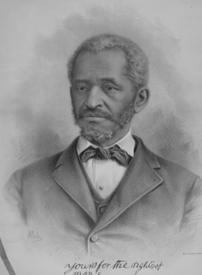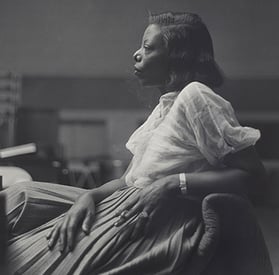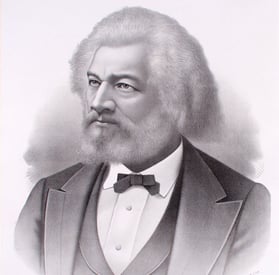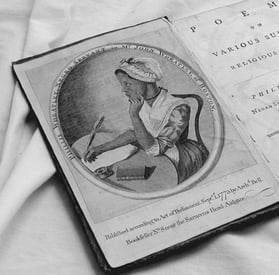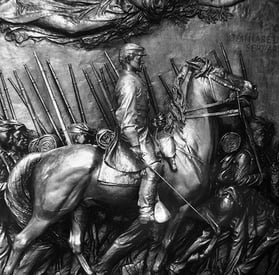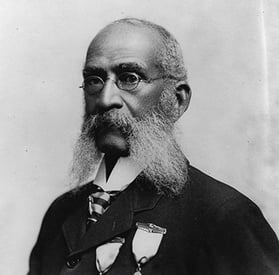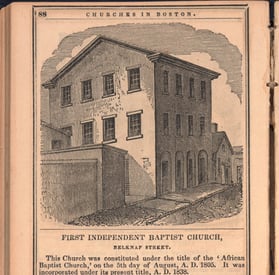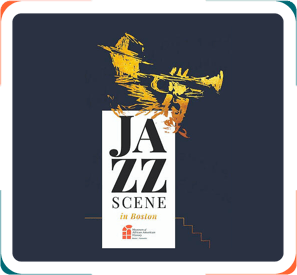A CALL TO ACTION:Protecting the Museum and the Integrity of Our Work GIVE TODAY

Black Voices of the Revolution: Liberty, Emancipation, and the Struggle for Independence
Black Voices of the Revolution: Liberty, Emancipation, and the Struggle for Independence is now open!
What do you do when a country cries out for liberty—but won’t offer it to you? In the shadowed alleys and crowded docks of Revolutionary-era Boston, Black men and women—enslaved and free—listened as white colonists thundered about freedom. They heard the speeches. They read the broadsides. But they knew: the liberty being shouted from the rooftops was not meant for them. Still, they stepped forward.
Interact with AI-driven, holographic images of primary sources, and the men and women who represented the African American community in Massachusetts during the period from the 1620s to 1800. Ask questions of the interactive using a voice activated program or by simply typing your queries on a touchscreen.
Funded in part by the Massachusetts Office of Travel & Tourism, MA250, and created in partnership with the exhibit design firm TimeLooper, Black Voices of the Revolution considers the American Revolution from the Black and female perspective, showcasing ideas, information, issues, and insights not often incorporated into traditional history lessons.
Selections from the Collection
The Museum of African American History holds a collection of over 3,000 items accrued over fifty years. Selections from the Collection features samples of our historical artifacts and art collection providing a lens unique to the narrative of African-descended people, places and events in America.
These historical artifacts chronicle a story that begins on the African continent, moves across the Middle Passage, anchors itself in Boston’s Harbor in 1638 with the arrival of the first documented kidnapped Africans on the slave ship, The Desire, and progresses to the establishment of a free black community on Beacon Hill in the late 1700s. These artifacts tell the real stories of Boston’s free black and abolitionist community who built gathering places, created organizations of agency and networked with others to claim their rights and to define their own identity for their own purposes.
Selections from the Collection authenticates the important and critical role Boston’s small but mighty black community played in the national story–from this country’s earliest days into the 20th century.
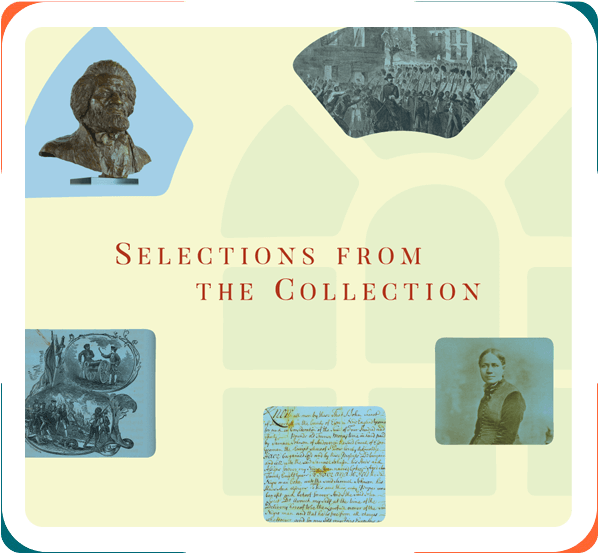
Past Exhibitions
Lewis Hayden and the Underground Railroad
Lewis Hayden - abolitionist, businessman, lecturer, and politician - is often described as a “man of action.” An escaped slave, he stood at the center of a struggle for dignity and equal rights in nineteenth-century Boston. His story remains an inspiration to those who take the time to learn about it.
JAZZ GREATS:
Classic Photographs from the Bank of America Collection
© Chuck Stewart Photography, LLC
This exhibition was loaned through the Bank of America Art in our Communities programExhibit was on view September 19, 2019- March 30, 2020The exhibition comprises 33 photographs by 16 photographers that date from the 1920s to the 1980s and portrays artists from varied genres in music and dance. Many are legends from the uniquely American art forms of jazz and modern dance; some are simply members of local communities entertaining their neighbors.
PICTURING FREDRICK DOUGLASS:
The Most Photographed American of the 19th Century
This exhibit was on view July, 2016 - August, 2020
Frederick Douglass was in love with photography. From his earliest known photograph in 1841 until his passing in 1895, he sat for his portrait whenever he could and became the most photographed American of the nineteenth century. In this first major exhibition of Douglass photographs, we offered a visually stunning re-introduction to America’s first black celebrity — immediately recognizable in his own lifetime by millions.
Picturing Frederick Douglass promises to revolutionize our knowledge of race and photography in 19th century America. It was acclaimed book of the same name by Drs. John Stauffer of Harvard University and Zoe Trodd of the University of Nottingham, co-curators of the exhibit.
FREEDOM RISING:
Reading, Writing and Publishing Black Books
This exhibit was on view January, 2015-December, 2015
Freedom Rising: Reading, Writing, and Publishing Black Books is a celebration of the rich tradition of African American literature.
Black Books explored the early black community of Boston and their purposeful, powerful, and prophetic use of the written word in pursuit of freedom and civil rights. The exhibit’s body of literature also examined artistic and creative expression in the 19th, 20th, and 21st centuries. It draws on the Museum’s antique book collection, the Clark Collection of African American Literature housed at Suffolk University’s Mildred F. Sawyer Library, and other archives, historical societies, libraries, and museums.
FREEDOM RISING:
Emancipation and the Black Soldier
This exhibit was on view March, 2013 - March 2014
Long before President Abraham Lincoln signed the Emancipation Proclamation on January 1, 1863, Boston’s black leaders were instrumental in the movement to include black soldiers in the Union Army. Freedom Rising, the exhibition, will focus on Boston’s 19th century community and its part in the campaign for inclusion of black troops in the Civil War and the subsequent recruitment and support of these soldiers as they fought for a united country, for their own freedom, and for the freedom of all black citizens. As a result of their efforts, the first all-black regiment from the North, the Massachusetts Volunteer 54th Infantry, marched from Boston to join the Union’s fight against slavery on May 28, 1863. Two other black Massachusetts regiments later entered the War: the 55th Infantry and the 5th Massachusetts Volunteer Cavalry.
BLACK ENTREPRENEURS
of the 18th and 19th Centuries
Entrepreneurship has always been a way for Americans to climb the economic ladder. Black Americans also took part in this American dream beginning when slavery was still legal in this country. Black Entrepreneurs of the 18th and 19th Centuries told the stories of some of the enterprising black entrepreneurs from the Revolutionary period through the 19th century in Boston and New England. It explored the little-known stories of early black entrepreneurs who invested their labor, time and money for their own business ventures, but also on behalf of freedom.
A GATHERING PLACE FOR FREEDOM
In commemoration of the 200th anniversary of the African Meeting House in Boston, the Museum of African American History presented a year-long exhibition, A Gathering Place for Freedom. The exhibition embodied the proud history of the free and self-emancipated black community of 19th century Boston who organized itself to build its own institutions as to lead in the movement to end slavery in this nation. The African Meeting House offers a unique window on this history that begins with the actual physical structures where people worked together to secure the promise of the Declaration of Independence.
Jazz Scene in Boston: Telling the Local Story
Jazz, America’s own music, has always had a home in Boston. But the city gained its place of prominence on the national jazz map in the 1950s, and continues to hold that place today. The sound of jazz poured from clubs like Storyville and the Jazz Workshop, played by musicians with deep Boston roots, including Jaki Byard, Roy Haynes, and Paul Gonsalves. Through photographs, handbills and posters set in a club-like setting, this colorful exhibit provides a broad view of the Boston scene from the 1940s to the 1980s. There’s also a closer look at the family of renowned drummer Terri Lyne Carrington, with their own 80-year history in the city.The exhibition includes images by noted jazz photographers Lee Tanner and Jack Bradley, as well as, photos and memorabilia from numerous private collections. The Museum also tapped the archives of institutions including the Berklee College of Music, W.E.B. Dubois Library at the University of Massachusetts, Amherst, and Salem State University. This exhibit was generously supported by Mass Humanities, Berklee College of Music Institute of Jazz and Gender Justice, National Endowment for the Humanities, Mass Cultural Council, and National Trust for Historic Preservation.






